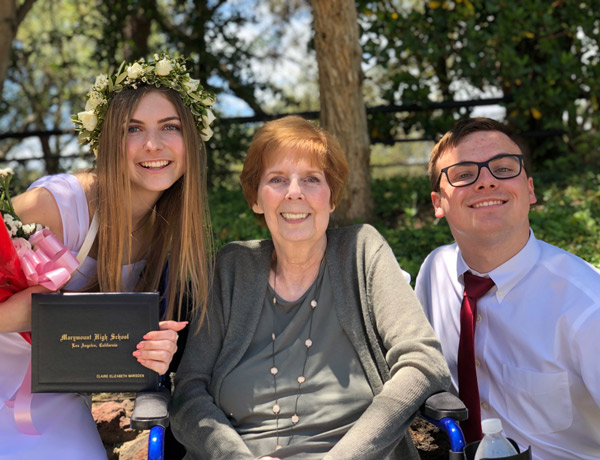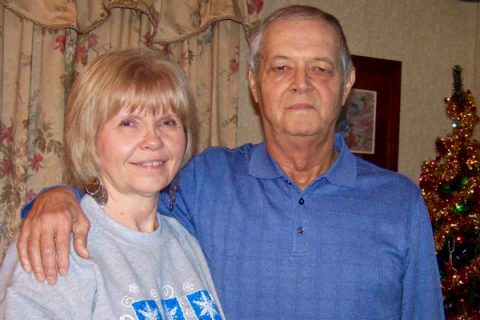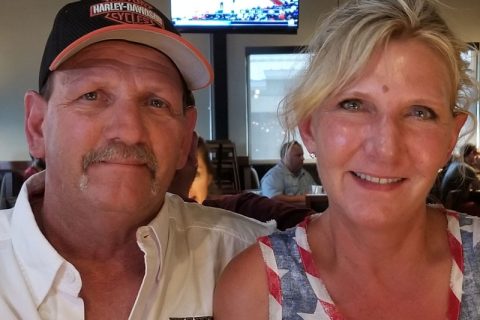Mesothelioma Survivor Still Relishing Graduation Day

Fact Checked | Written by: Tim Povtak | Last Update: 10/25/2024 | 5 Min Read
Six years after aggressive surgery for pleural mesothelioma, Kay Kilpatrick-Simmons watched proudly as granddaughter Claire crossed the stage at Marymount High School to accept her diploma last month.
Mission accomplished.
The congratulatory hug was emotional — in more ways than one.
Kilpatrick-Simmons, 73, already has beaten the odds, using her goal-setting power of positive thinking, family support and the expertise of Dr. Robert Cameron, mesothelioma specialist and senior professor of thoracic surgery at UCLA Medical Center.
“One of my goals was to be around long enough to see the grandkids graduate,” Kilpatrick-Simmons told Asbestos.com. “This was the second one. And it means a lot. Sure, I’d love to see a couple more.”
Clayton, 12, and Anna, 6, are next in line.
“I like to set goals and focus on them,” she said. “Mental attitude plays into this. How much? I’m not sure, but I won’t watch sad movies, for example, only happy stuff, comedies. I stay away from anything that might be depressing. I try not to even think about this disease unless I have a scan coming up.”
Dr. Cameron Makes A Difference
Kilpatrick-Simmons sees Cameron every three months for checkups at UCLA, where she first underwent the aggressive pleurectomy and decortication (P/D) surgery in 2012.
The post-surgery survival has been a fight that tested her determination. The radiation treatments caused pneumonitis, a serious inflammation of the lung that required hospitalization.
Extensive chemotherapy caused kidney failure and another trip to the hospital.
She rebounded both times and watched her oldest grandchild (Scott) graduate two years ago.
She also underwent cryoablation, a novel treatment at UCLA which involved killing recurrent mesothelioma tumor cells with liquid nitrogen.
Recent scans show no new tumor growth, but catching her breath after a short walk still can be difficult. She travels a lot by wheelchair.
She has met with a nine-year mesothelioma survivor who also is a patient of Cameron’s and doing equally well. Together, they have become an inspiration to many, far exceeding the typical expectations with pleural mesothelioma.
“Dr. Cameron has been great. He’s always encouraging, motivating me,” Kilpatrick-Simmons said. “He’s like a cheerleader almost, raising my spirits each time I see him. A lot of people didn’t think I would make it this far. He did. He always did.”
Her biggest supporter throughout this fight has been husband Cliff, who is 13 years older but has served as her primary caregiver. He fractured his hip a year ago but still insisted on accompanying her to a checkup.
They laugh about it now.
“Somebody said we looked like a train going into the doctor’s office, each of us getting pushed in a wheelchair,” she said. “But he’s better now, doing everything again. He’s been unbelievably supportive.”
Mesothelioma Diagnosis Was Stunning
Kilpatrick-Simmons spent much of her career in health care — first as a clinical nurse before moving into administrative work.
She was stunned by the original diagnosis, which came not long after she and her daughter finished a two-day, 40-mile walking marathon.
It was the seventh time they had done it together, an annual breast cancer awareness event.
But something felt different that last time. It seemed more grueling than usual.
“I used to walk five miles a day, worked out with a trainer, kept in good shape. But now I’m pretty much sedentary,” she said. “My legs are still great, but breathing can be a problem when I try to exercise. If not for that, I might still be dancing.”
Staying Strong and Positive
Instead of exercising now, Kilpatrick-Simmons keeps a daily journal, usually documenting the day’s events each evening.
“I write down what I’m grateful for, things as simple as going out to dinner with my husband, watching the birds out back on the fence, visiting with friends, going to graduation,” she said. “It keeps me positive. Back when I was healthy and working, I was too busy to stop and appreciate the little things that I was grateful for.”
She is especially grateful for finding Cameron, whose office is three miles from her home in Los Angeles.
There are patients who travel from around the country for his expertise in treating mesothelioma.
She found him around the corner.
And despite the disease, the tone of her voice is consistently positive. Instead of bemoaning her fate, she talks about new doors it opens.
“It makes you appreciate things. Seeing life from a wheelchair is an interesting human study from my perspective,” she said. “People either don’t see you, or they are totally sweet. When I go to a school function, I could not be treated better if I was a queen. It’s wonderful.”
Her weekend after Claire’s graduation last month was typical.
“It was a weekend of parties. My daughter and her husband hosted a big barbecue. It was a lot of fun,” she said. “It may have been a small graduating class, but there was a lot of celebrating. I used to love being part of those big crowds. It felt really good to be there.”





